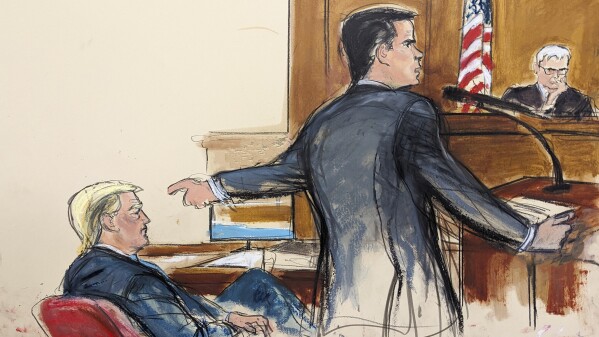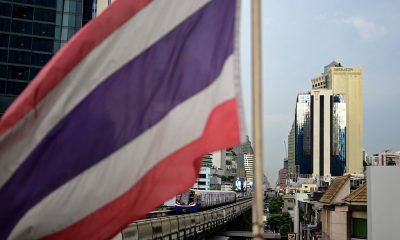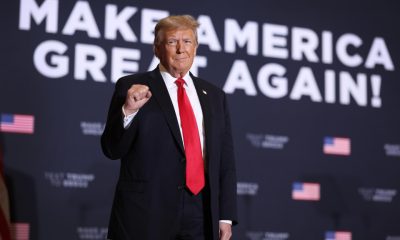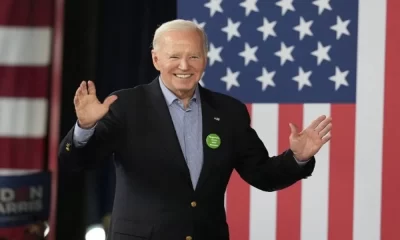Politics
Former President Trump Will Avoid Trial on 2020 Election Charges

Former President Donald Trump is facing significant charges in two trials, including whether he intended to subvert the Constitution by overriding the results of a fair election and illegally remaining in power.
However, a New York case involving bribes to silence an adult film performer may provide the sole legal reckoning this year about whether the Republican attempted to destroy a pillar of American democracy.
The hush money case charges Trump with attempting to falsify business records, but it was difficult to determine as the trial began Monday.
During his opening arguments, lead prosecutor Matthew Colangelo spent minimal time linking the case to Trump’s campaigns during his first presidential bid. He claimed that the payments made to Stormy Daniels constituted “a criminal scheme to corrupt the 2016 presidential election.”
Whether the jury recognizes that connection will determine Trump’s fate. The probable Republican nominee is facing allegations of manipulating company documents, which are normally misdemeanors unless linked to another crime.
Change the 2020 election results
Prosecutors were able to charge them with felonies because they allege that the fake records were part of an effort to cover up state and federal election law breaches — albeit this is still not the same type of direct election tampering that Trump is facing elsewhere.
Trump has referred to the New York trial and the three other criminal charges filed against him as a kind of election meddling, implying without evidence that they are part of a Democratic plot to disrupt his campaign for reelection.
“I’m here instead of being able to campaign in Pennsylvania, Georgia, and many other places, which is very unfair,” he told reporters before Monday’s court session.
While the allegations are felonies, the New York case is considered the least serious against the former president. In the two election cases, Trump is accused of a more direct role in attempting to change the 2020 election results.
He faces a four-count federal indictment in Washington for his conduct leading up to his supporters’ violent attack on the US Capitol on January 6, 2021. He and others were accused in Georgia with breaking the state’s anti-racketeering legislation by attempting to illegally overturn his 2020 election loss to Democrat Joe Biden. He has pled not guilty to all of the allegations against him, including a fourth for mishandling confidential data.
All of the other cases are involved in appeals, which are expected to postpone any trials until after the November election. If that happens, the New York case will be the lone legal test throughout the campaign to determine whether Trump sought to illegally manipulate an election — and it’s not even about the election results he intended to overturn.
Linking Payments to election interference
On Monday, Trump’s attorney moved immediately to refute the notion that a case about record-keeping could be considered an illegal attempt to disrupt an election.
“I have a spoiler alert: there’s nothing wrong with attempting to influence an election.” Todd Blanche, his attorney, said that it is known as democracy. “They added something evil to this idea, as if it were a crime. You’ll discover it’s not.”
Some legal experts tracking Trump’s cases said they were cautious of linking the payments to “election interference.” This also risks reducing the seriousness of the other charges in the public mind.
Richard Painter, a University of Minnesota Law School professor and former associate White House counsel during the George W. Bush administration, said the facts of the case met the evidence needed to determine whether a felony had been committed that violated campaign law, but added, “The election interference part, I have a little bit of trouble with this.”
According to Richard Hasen, a UCLA law expert, the New York case pales in comparison to the other election-related claims against Trump.
“We can draw a fairly bright line between attempting to change vote totals to flip a presidential election and failing to disclose embarrassing information on a government form,” he said in a recent Los Angeles Times essay.
In an email, Hasen stated that New York prosecutors were treating the case as election meddling “because that boosts what may be the only case heard before the election.”
Fabricating business records
Some said that prosecutors’ decision to portray the New York case as election interference was an attempt to increase its attention.
“When (Manhattan District Attorney) Alvin Bragg calls it an election interference case, that’s more of a public relations strategy,” said Paul Butler, a former federal prosecutor and Georgetown Law professor. “I think there was concern that people were looking at the other prosecutions and they weren’t discussing the Manhattan case.”
Declaring the case a hush money trial made it appear less relevant than the others, so they rebranded it as a case about election meddling. But, once again, he is charged with fabricating business records.
Trump has denied having a sexual encounter with Daniels, and his lawyers claim the payments to Cohen were reasonable legal expenditures.
According to Chris Edelson, an assistant professor of government at American University, the essential point in the prosecution’s case is why were the business documents faked. They claim that “Trump was preventing voters from making an informed decision in the election.”
It is an argument he feels prosecutors can present. “I believe that the prosecutors will need to explain this to the jury. “I do not think it is impossible,” he replied.
The New York trial revolves around charges that Michael Cohen, Trump’s former lawyer and personal fixer, paid Daniels $130,000 to keep her claims of a sexual encounter with Trump from becoming public in the final days of the 2016 presidential campaign.
“Candidates want to hide negative news about themselves. But there’s a difference between trying to limit people’s access to that information and breaking the law to keep them from finding out,” said Andrew Warren, a former state attorney in Florida who was suspended by Republican Gov. Ron DeSantis and is running for his old job while his court case is ongoing.
Warren believes the matter has always been about more than just cash. If it is considered as a hush money case, “Trump wins,” he stated. “If there was intent to deceive the voters, the prosecution wins.”
Source: AP


































